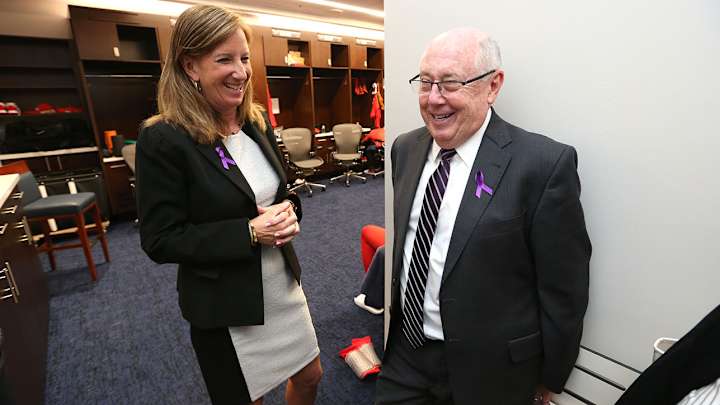WNBA Commissioner Cathy Engelbert on Her Plans to Make the League Bigger and Better

Cathy Engelbert has quite a bit of work ahead of her. The WNBA's new commissioner will have to tackle a few important issues right away: Two players are facing domestic abuse accusations, a new collective bargaining agreement needs to be negotiated and the league must figure out how to capitalize on a surge in coverage of women's sports that reached a crescendo with the U.S. women's national team winning the 2019 World Cup.
But if there's anyone who can handle it, it's the former CEO of Deloitte who once played point guard for Muffet McGraw at Lehigh. So what does Engelbert have in store for the WNBA? First, she's focused on WNBA All-Star Weekend in Las Vegas, but she has plenty of plans for the W's future.
SI: You just finished a four-year term as CEO of Deloitte. Why did you want to take on this new challenge?
Cathy Engelbert: After over three decades in the corporate world, I was looking for something different with a broader women’s leadership platform. And it’s a sport I have passion for, having played college basketball. What better time to work with the sport I love at a moment when there’s a broad social conversation around gender and women and leadership.
SI: What’s the best thing about the WNBA right now?
CE: The league stands for the power of women. It’s such a diverse league with talented, elite athletes—college graduates, very smart. There are so many angles we can use to elevate the brand and build the WNBA into a sustainable business model.
SI: What are your first priorities?
CE: First up is the All-Star Game in Las Vegas on July 27. That will give me the opportunity to meet players, coaches, owners—everybody in the ecosystem of the WNBA—and really start my listening tour. I’ve made no secret about what the priorities are: Look at the financials, and make sure we’re building a league worthy of these elite players. Put more fans in the seats, work on the player experience, and in the backdrop, we have the collective bargaining conversation going on.
SI: How are you getting up to speed on the CBA negotiations?
CE: I met with [WNBPA executive director] Terri Jackson this week and obviously I talked to some of the owners during the hiring process. We all have the same goals: trying to make sure that the level of play on the court is recognized more broadly and by a more diverse audience.
SI:How do you plan to increase the WNBA’s audience, especially among millennials?
CE: For millennials and digital natives, the demand for entertainment is there, but we need to have a product that they want to go see and want to follow, whether it’s in arena or on one of our digital platforms. The social responsibility these players feel is pretty unique and I think that’s a draw for socially conscious millennials.
SI:There seems to be a lot of buzz about women’s sports now, with new pro leagues forming and all the attention the women’s soccer team received for winning the World Cup. How can the WNBA capitalize on that?
CE: The W has been ahead of the curve—It’s the only professional women’s league that has lasted over two decades. I’m solely focused on our 12 franchises in this league but I’m certainly willing to participate in the broader women’s sports ecosystem. I loved the outcome on the women’s soccer and would love to capitalize on the momentum that creates for women in sports because that then creates a narrative around future leaders, whether it’s in business or government or academia. Women need to step up and be leaders, and it’s such an opportunity for these players to become the future leaders in America.
SI: What lessons from playing sports have helped you in your career?
CE: I was a captain my senior year at Lehigh in both basketball and lacrosse, and I think all the time about how those formative years gave me the confidence that, when I joined the business world and saw mostly men around me, I could succeed. Before that, I grew up playing against my brothers in the backyard. My mother always said, “You’ve done well because you grew up alongside five boys and you had to be competitive, but at the same time be a team player.”
SI: Do you still play?
CE: [laughs] No. At my age (54), I couldn’t keep up with the girls today. At 5' 10" I was one of the tallest point guards in the league; now I’d be one of the shortest. I never lifted a weight. These girls now are all so tall and so strong. We have a hoop in our yard and I’ll play around with my son. I coached my daughter’s middle school basketball team for four years and that was one of the biggest challenges of my career.
SI: What do your kids think of your new job?
CE: My coolness factor increased with both of my kids.
